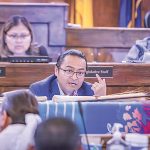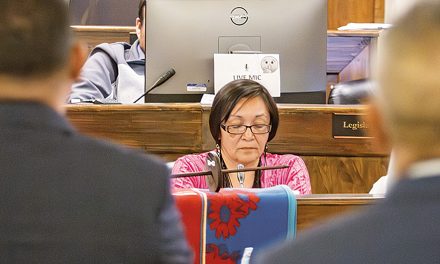
50 Years Ago: Times gets job offer story wrong
Fifty years ago, the Navajo Times got it all wrong.
Of course, no one at the Times knew back in May 1969 that the article they published on the front page that week had a major mistake. That would not become evident until four years later. The article was headlined: “Navajo leader declines top Indian position.” “Navajo tribal leader Peter MacDonald has been offered the position of U.S. Commissioner of Indian Affairs by Interior Secretary Walter Hickel, but has declined it,” the article began. MacDonald’s selection had been reported by the Arizona Republic which said that President Richard Nixon had selected MacDonald to replace Robert Bennett.
“I met with Mr. Hickel last month,” MacDonald told the Times, “and he offered me the position but there were several reasons I declined.” MacDonald at the time was director of the Office of Navajo Economic Opportunity. By that time, MacDonald was one of the most well-known Indian leaders in the country.
MacDonald said the primary reason he declined the position was because he felt the situation he was seeing on the Navajo Reservation was a serious one and he felt if he took the position, it would be “too abrupt a move” to make at that point. Years later, Hickel wrote a book about his time as Interior Secretary called “Who Owns America” and in it he talked about MacDonald and that position. In the book, Hickel said MacDonald was the early choice for the position because he was one of the few Indian leaders who were Republican and Nixon, a Republican, wanted to choose someone from his own party.
MacDonald also had the charisma Nixon thought was needed for the position. In fact, MacDonald, said Hickel, had everything going for him except for one fact: He had three children out of wedlock with his secretary at ONEO and he also had a wife. Nixon, who was a prude on those kinds of matters, rejected him out of hand so there was no position for MacDonald to turn down or accept.
Why MacDonald said he was offered the position and declined was probably a matter of saving face. He probably wasn’t that upset with the rejection because by that time he knew he would challenge Nakai for the chairmanship position in 1970. Of course, he was keeping his future plans to himself because he wanted to keep his ONEO position as long as he could, not only because of the money but also because it gave him a lot of notoriety.
In other news, the Navajo Tribal Council decided to honor Dr. George Bock and his wife, Harriet, at next month’s Council session. This was an unusual decision since the Council seldom honored non-Navajos and, to anyone’s memory, had never honored a man and his wife.
Dr. Bock was director of the Navajo Area Indian Health Service and his wife had become a best friend of Navajo servicemen. Since the Vietnam War became intense in 1964, Mrs. Bock had written more than 2,000 letters to Navajos serving in the Armed Services and every one was different. Many of them talked about what was going on in the serviceman’s family as Navajos who did not write would come to her to tell their loved ones what was going on.
The Times said she also received thousands of letters from servicemen asking her to get in touch with their loved ones. And, according to the Times, she never said no to these requests.
It helped that her husband was head of the IHS on the reservation because it was more than likely that the person she was looking for had been to an IHS facility and had left information on how to get in touch with them.
The two first came to the reservation some 14 years before on a vacation and fell in love with the reservation and its people. So it came as no surprise when six and a half years ago, Dr. Bock accepted the top position for the Navajo Area. The two also opened their doors to returning servicemen, asking them to stop by and have dinner. Hundreds of servicemen took them up on their offer.
In her spare time, Mrs. Bock also used her own money and funds solicited from others to buy presents for children in IHS hospitals. She also collected food for needy families at Thanksgiving and Christmas. And even if this wasn’t enough, she was also noted for making sure that the American flag was flown every day at the veteran’s cemetery in Fort Defiance. A number of Navajo families also told of her generosity in helping them financially in troubling times and of just being there if they needed someone to talk to.
To read the full article, pick up your copy of the Navajo Times at your nearest newsstand Thursday mornings!
Are you a digital subscriber? Read the most recent three weeks of stories by logging in to your online account.








 Highway 264,
Highway 264, I-40, WB @ Winslow
I-40, WB @ Winslow